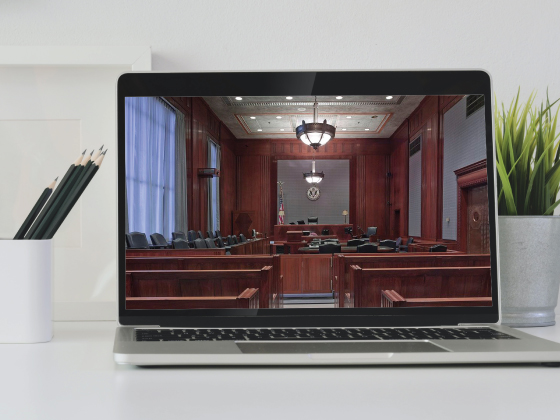Tips on Navigating Remote Court Hearings

Thème: Family Law mai 26, 2020 by Mimi Marrello
With the current COVID-19 pandemic, the Ontario Courts have been suspended except for emergency matters. The suspension of the court operation has recently been extended to at least July 6, 2020.
As a result of the suspension of in-person hearings, the Court has implemented remote hearings and appearances in the circumstances in order to deal with emergency matters. These appearances in Ottawa have for the most part been held by way of teleconferences and virtual platforms such as Zoom appearances. While the pandemic will hopefully end one day (soon maybe?), regular court house operations will not likely resume in the near future. Given that attending Court remotely is now the temporary normal, the purpose of this blog is to list some best practices for remote hearings.
Here are some tips that you should remember, even if you have a lawyer representing you:
- If you have any concerns about the type of hearing scheduled such as sensory impairments, disability or translation needs, advise the other party and the Court without delay.
- If you are not familiar with the platform being used (either telephone conference call or Zoom/Skype/CourtCall/Microsoft Teams), do a test run prior to the appearance and test out the software, camera and microphone.
- Join the appearance ahead of the scheduled time to make sure that there are no technical difficulties to resolve.
- Attire and etiquette are required for all court appearances, even if by camera. Make sure that the lighting and the background is appropriate. Each participant should look into the camera when speaking. Business attire should be worn if the proceedings are on camera.
- Make sure that your name displayed on the virtual platform is appropriate. If by telephone, make sure to introduce yourself every time prior to speaking so that everyone is aware on who is speaking during the proceedings; this is also important for the court reporter and recordings.
- It is important to limit background noise. If possible, use wireless or blue tooth headphones to limit distractions. Try to participate in the hearing in a separate room with a closed door from other members in your household, especially children. If possible, have another adult supervise the children in a separate room.
- Like in the courtroom, please turn off your cell phone in order to reduce any interruptions during the hearing.
- Remember that everything you say and do will be heard by all. In order to limit any distractions (such as background noise which includes sighing), it is recommended that you mute your phone when not speaking. You can do so by dialling *6 (and *7 to unmute). If using an online platform, you can and should mute your microphone at all times except when you are speaking.
- Be conscious of the fact that your facial expressions will be seen by all, including the Judge.
- It is more important to speak slowly and clearly. Even though technology has advanced over the years, it is not perfect and there may be lags.
- Court staff may need to have you swear that your evidence in affidavits filed with the court, likely without being commissioned under oath, are true and accurate to the best of your knowledge. If this is required, it will usually be done before the Judge will hear submissions from the parties.
- Be patient as participants should speak one at a time. Despite not being in a courtroom, you must be respectful and not interrupt or speak over someone already speaking, especially the Judge. If you must interrupt, you may want to note down your thought and raise it once it is your turn to speak.
- You will not be able to write a note to your lawyer during a hearing (either by telephone or by video) so in advance it is important to discuss with your lawyer how you will be communicating when you have something to add or a question during the proceeding. A suggestion would be to agree to send an email to your lawyer if a particular point must be raised. Once the hearing has taken place, it will be too late to add any further comments or submissions to the Judge.
- If on a virtual call, every participant will be able to see you and note your behaviour and responses to things said, like a Judge can do in a formal courtroom. In a courtroom, you would have the benefit of having your lawyer sitting beside you and guiding you. This will not be the case during a zoom conference so your behaviour is even more important. All participants should be calm, civil and respectful throughout the proceedings.
While remote hearings are new, it is likely that these types of hearings may be implemented more frequently going forward. It is important to remember that decorum and etiquette are necessary even if the hearing is done by phone or virtual recording.
If you have any questions about these tips or any family law matter, you can contact one of the members of the LMR Family Law Group for information at www.lmrlawyers.com.
[ssba]



